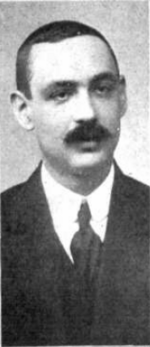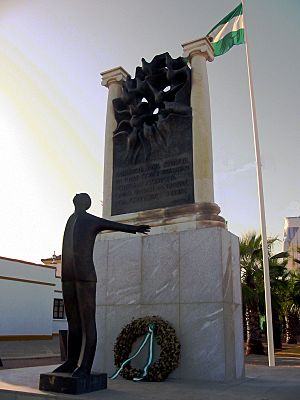Blas Infante facts for kids
Quick facts for kids
Blas Infante
|
|
|---|---|

Blas Infante, c. 1914
|
|
| Born |
Blas Infante Pérez de Vargas
5 July 1885 Casares, Málaga, Spain
|
| Died | 11 August 1936 (aged 51) Seville, Spain
|
| Cause of death | Execution by firing squad |
| Nationality | Spanish |
| Alma mater | University of Granada |
| Occupation | Notary, writer |
| Political party | Federal Democratic Republican Party |
Blas Infante Pérez de Vargas (born July 5, 1885 – died August 11, 1936) was an important Spanish politician and writer. He is often called the "Father of Andalusia" (Padre de la Patria Andaluza). He believed strongly in the unique culture and identity of the Andalusian region in Spain.
Blas Infante was an idealist who wanted to improve life for people. He started a special meeting in Ronda in 1913. At this meeting, they created a plan for Andalusia to have more self-rule. This plan was based on an older idea from 1883.
He also helped design the current flag and emblem for Andalusia. These symbols were inspired by old Andalusian designs from history. During the time of the Second Spanish Republic, Infante led a political group called the Junta Liberalista. This group worked for more self-governance for Andalusia.
Sadly, Blas Infante was one of many important people who were killed by soldiers when the Spanish Civil War began in 1936. This happened when forces took control of Seville. Because he supported regional self-rule and fair ideas for society, he was targeted.
Today, his last home in Coria del Río is a museum. It is called the Museum of Andalusian Autonomy. It teaches visitors about Andalusia's history and its journey to self-governance.
What He Wrote
Blas Infante was a talented writer. He wrote many books and articles about his ideas and about Andalusia.
Published Books
Here are some of the books he published:
- La Obra de Costa (1916)
- La Sociedad de Naciones (with J. Andrés Vázquez, 1917)
- Motamid, último rey de Sevilla (1920)
- Cuentos de Animales (1921)
- Los Mandamientos de Dios a favor de los animales (1921)
- La Dictadura pedagógica (1921)
- Reelección Fundamental – Primer Volumen – La Religión y la Moral (1921)
- Orígenes de lo flamenco y secreto del cante jondo (1929–31)
- La verdad sobre el complot de Tablada y el Estado libre de Andalucía (1931)
- Cartas Andalucistas de Septiembre de 1935 (1935)
- Manifiesto a todos los andaluces (1936)
Unpublished Works
He also had some writings that were not published during his lifetime:
- Fundamentos de Andalucía – 1ª serie de Cartas Andalucistas (1929)
- El Libro Nuevo
- Almanzor
See also
 In Spanish: Blas Infante para niños
In Spanish: Blas Infante para niños
 | Stephanie Wilson |
 | Charles Bolden |
 | Ronald McNair |
 | Frederick D. Gregory |


